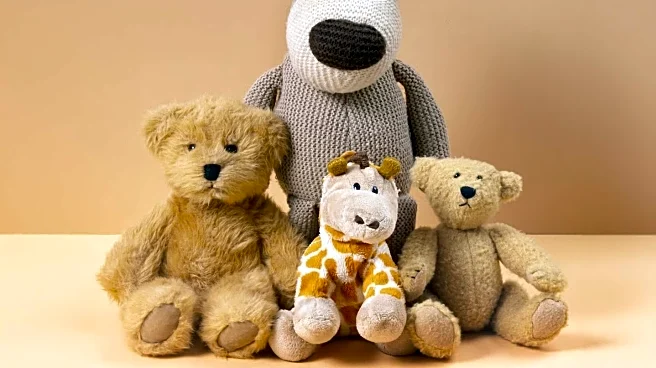What's Happening?
Jellycat toys, known for their soft texture and quirky smiles, have become increasingly popular among young adults, rather than children. This trend is attributed to a desire for comfort and nostalgia
in a world perceived as harsh and overstimulating. The Jellycat company has seen a significant increase in its annual global income, reaching $252 million by the end of 2023, and the term 'jellycat' has experienced a 208% increase in online search volume. Influencers and social media platforms like TikTok have played a role in this surge, with individuals showcasing extensive collections of Jellycat toys. The toys offer a tactile comfort that helps alleviate emotional overload, according to Quinn Harper-Thorpe, a psychotherapist and Jellycat enthusiast.
Why It's Important?
The growing popularity of Jellycat toys among young adults highlights a broader societal trend towards seeking comfort and nostalgia amidst uncertainty and stress. This shift has implications for consumer behavior, as individuals increasingly invest in items that provide emotional relief. The phenomenon also underscores the role of social media in shaping consumer trends, as platforms like TikTok amplify the visibility and desirability of such products. Businesses in the toy and lifestyle sectors may benefit from understanding and catering to this demand for nostalgic and comforting products, potentially leading to new marketing strategies and product lines.
What's Next?
As the demand for Jellycat toys continues to rise, the company may explore expanding its product offerings or marketing strategies to further capitalize on this trend. Other businesses in the lifestyle and toy industries might also consider tapping into the nostalgia market by developing products that evoke similar emotional responses. Additionally, the influence of social media on consumer behavior is likely to persist, prompting companies to engage more actively with platforms like TikTok to reach potential customers. The ongoing interest in comfort and nostalgia could lead to collaborations between brands and influencers to promote products that resonate with these themes.
Beyond the Headlines
The Jellycat trend reflects deeper psychological and cultural dynamics, where individuals seek solace in familiar and comforting objects amidst societal pressures. This behavior may indicate a growing need for emotional support and grounding in everyday life, influencing not only consumer habits but also broader cultural practices. The emphasis on nostalgia and comfort could lead to shifts in how people interact with their environments, prioritizing spaces and items that offer emotional refuge. This trend might also inspire discussions around mental health and the importance of creating supportive environments in both personal and public spaces.









